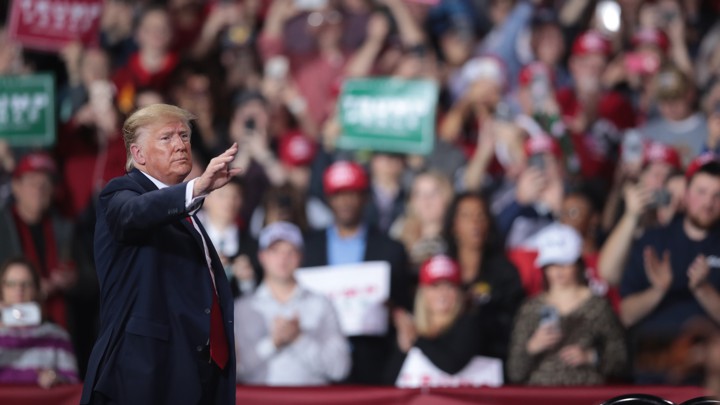A conventional president beset by political crisis would strive to show that he’s focused on the job, but that’s not Trump’s way. Impeachment is, for him, an obsession that he’s taking no steps to conceal. Campaign aides insist that the furor has boosted fundraising and helped mobilize supporters, though they have an incentive to say so—admitting that it’s a setback of any sort is unthinkable. “Ever since this began, every time the Democrats or the media go into impeachment frenzy, our fundraising—particularly small-dollar fundraising—goes through the roof,” Tim Murtaugh, a Trump-campaign spokesman, told me.
Read: Donald Trump made his own impeachment inevitable
Still, Trump clearly is unhappy about the permanent blot on his record, even if the Republican-controlled Senate ultimately acquits him, as is expected. Last night, he singled out Senate Minority Leader Chuck Schumer, who has demanded that a trial make space for more witnesses. “I used to be a big contributor. He used to kiss my ass,” the president said of Schumer, a fellow New Yorker. “Find out how much money did I give or raise to Chuck Schumer. And Chuck, give all that money back, please.”
Reelection is also a Trumpian preoccupation, and in attacking one of his rivals last night, he resurrected a drama from two years ago—wait, no, it was only two weeks ago. He mentioned a leading Democratic presidential candidate, Senator Elizabeth Warren of Massachusetts, and claimed that she isn’t filling the seats at her events. His son Barron, he argued, could draw bigger crowds than Warren in New York’s Central Park—“and he’s 13.” Earlier this month, the first lady, Melania Trump, criticized a Stanford University professor, Pamela Karlan, who testified in the impeachment proceedings and invoked Barron’s name. Though Karlan would later apologize, Donald Trump doesn’t seem as concerned as his wife about shielding his son.
A Trump rally is always a kind of performance art. As one person close to the White House told me recently, Trump believes that the audience wants a show and sees it as his job to deliver. Last night, he went on a long, nostalgic tangent about sinks, showers, toilets, and light bulbs that weren’t built to conserve energy or resources. He misses them. These days, said the loud guy on the bar stool—er, the 45th president—“you want to wash your hands and turn on the sink,” but “no water comes out.”
It says something about the times we live in that when I hear these sorts of musings, I find myself unclenching a bit. Even a temporary break from the vitriol and nonstop name-calling is welcome. At the very least, in the age of Trump, it can make a day seem like a day, not an eternity.
We want to hear what you think about this article. Submit a letter to the editor or write to letters@theatlantic.com.
Peter Nicholas is a staff writer at The Atlantic, where he covers the White House.


